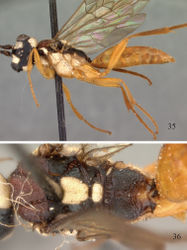Difference between revisions of "Orthogonalys seyrigi"
m (Imported from ZooKeys) |
m |
||
| (2 intermediate revisions by 2 users not shown) | |||
| Line 11: | Line 11: | ||
| pages = 1--25 | | pages = 1--25 | ||
| doi = 10.3897/JHR.24.1811 | | doi = 10.3897/JHR.24.1811 | ||
| − | | citationurl = http://www.pensoft.net/journals/ | + | | citationurl = http://www.pensoft.net/journals/jhr/article/1811/citation/ |
| − | | url = http://www.pensoft.net/journals/ | + | | url = http://www.pensoft.net/journals/jhr/article/1811/abstract |
| publisher = Pensoft Publishers | | publisher = Pensoft Publishers | ||
| publisherurl = http://www.pensoft.net/ | | publisherurl = http://www.pensoft.net/ | ||
| Line 50: | Line 50: | ||
==Taxon Treatment== | ==Taxon Treatment== | ||
| − | *{{aut|Smith, D}}; {{aut|Tripotin, P}}; 2012: Trigonalidae (Hymenoptera) of Madagascar [http://www.pensoft.net/journals/ | + | *{{aut|Smith, D}}; {{aut|Tripotin, P}}; 2012: Trigonalidae (Hymenoptera) of Madagascar [http://www.pensoft.net/journals/jhr/ ''Journal of Hymenoptera Research'',] '''24''': 1-25. {{doi|10.3897/JHR.24.1811}} |
==Other References== | ==Other References== | ||
Latest revision as of 10:36, 11 January 2012
| Notice: | This page is derived from the original publication listed below, whose author(s) should always be credited. Further contributors may edit and improve the content of this page and, consequently, need to be credited as well (see page history). Any assessment of factual correctness requires a careful review of the original article as well as of subsequent contributions.
If you are uncertain whether your planned contribution is correct or not, we suggest that you use the associated discussion page instead of editing the page directly. This page should be cited as follows (rationale):
Citation formats to copy and paste
BibTeX: @article{Smith2012JournalofHymenopteraResearch24, RIS/ Endnote: TY - JOUR Wikipedia/ Citizendium: <ref name="Smith2012Journal of Hymenoptera Research24">{{Citation See also the citation download page at the journal. |
Ordo: Hymenoptera
Familia: Trigonalidae
Genus: Orthogonalys
Name
Orthogonalys seyrigi Bischoff – Wikispecies link – Pensoft Profile
- Orthogonalos seyrigi Bischoff, 1933: 483.–Bischoff 1938[1]: 6.–Benoit 1951[2]: 143.
- Orthogonalys seyrigi seyrigi: Weinstein and Austin 1991[3]: 422.
Type material
Bischoff (1933)[4] stated “Eine Anzahl ♂♂ und ♀♀ liegen vo von [?] Madagaskar, Rogez, IX-XII. 30, II. 31, II. 32, X. 32, XI. 32 Seyrig S.” and “Als Typus bezeichne ich ein Männchen von Rogez, II.31, als Allotypus ein Weibchen vom gleichen Fundort und Datum. Paratypen auch in Museum Paris.” The holotype male at MNHU is labeled “Madagascar, Rogez, 11.31, A. Seyrig” “Orthogonalos seyrigi Bisch. Type ♂ 1933, det. Bischoff” “TYPUS” “Zool. Mus. Berlin.” There are also seven paratype males, five with the same data as the holotype except XII.30 (4) and II.31 (1), and two males labeled “O. –Madagaskar, Rogez 11.32, Seyrig S.”
There are five paratypes at MNHN from Rogez, most in bad condition. Two are males, one with the antennae missing; one is a female, probably the only female in the original type series and the allotype designated by Bischoff, and is missing the head; two others are probably males but have the head and metasoma missing.
Description
Female. Known by female allotype as designated by Bischoff (1933)[4] in MNHN. The head is missing but otherwise similar to male.
Male
(Fig. 35). Length, 8.0 – 9.0 mm. Antenna black with apex of 9th antennomere and antennomeres 10–15 completely white. Head white with vertex black, black narrowly extending to dorsal margin of eyes and as broad stripe anteriorly to antennal sockets; small medial black spot on dorsal margin of clypeus (Figs 37, 38). Mesosoma white laterally and ventrally with central dark stripe on pronotum; area anterior to transscutal articulation red, posterior to transscutal articulation black with mesoscutellum and metascutellum white. Legs orange with hind tibia and tarsus sometimes slightly darker orange than rest of legs. Wings hyaline; veins and stigma black. Metasoma mostly orange, base of first tergite black; lateral margins of tergites and posterior margins of sternites whiter. Male genitalia brown.
Antenna with 26 – 28 antennomeres. Head from above with posterior margin slightly concave; head behind eyes subequal to eye length (Fig. 38). Mesoscutellum with anterior width 1.1× medial length; metascutellum about 1.5× broader than long (Fig. 36). Dorsum of mesosoma shiny, with large punctures separated by 2–3× puncture diameters. Propodeum coarsely reticulate anteriorly, irregularly transversely carinate posteriorly (Fig. 36). Genitalia with paramere short, about as long as broad and broadly rounded posteriorly (Fig. 39).
Distribution
Madagascar: Mahajanga (Andreba) (Benoit 1951[2]); Toamasina. Tanzania (tentative identification, Carmean and Kimsey 1998[5]).
Remarks
Bischoff (1933)[4] described the species from both sexes. All types at MNHU are males, and all except one of those at MNHN are apparently males. The one female at MNHN is probably the allotype, but it has the head missing and therefore we cannot characterize the female. We have not seen specimens other than the type series.
The short parameres of the male genitalia (Fig. 39) relate this species to Orthogonalys brevis (Fig. 6) but in Orthogonalys seyrigi the parameres are about as long as broad, the genae are white, the white on the frons is interrupted by a broad median black stripe, and the mesosoma is red anterior to the transscutal articulation, and black posterior to it with the mesoscutellum and metascutellum white.
Taxon Treatment
- Smith, D; Tripotin, P; 2012: Trigonalidae (Hymenoptera) of Madagascar Journal of Hymenoptera Research, 24: 1-25. doi
Other References
- ↑ Bischoff H (1938) Trigonaloidae. In: Hedicke H (Ed) Hymenopterorum Catalogus, Pars 5. Dr. W. Junk, Gravenhage, 18 pp.
- ↑ 2.0 2.1 Benoit P (1951) La systématique des Trigonaloidae (Hym.) éthiopiens. Revue de Zoologie et de Botanique Africaines 44 (2): 141-147.
- ↑ Weinstein P, Austin A (1991) The host relationships of trigonalid wasps (Hymenoptera: Trigonalyidae), with a review of their biology and catalogue to world species. Journal of Natural History 25 (2): 399-433. doi: 10.1080/00222939100770281
- ↑ 4.0 4.1 4.2 Bischoff H (1933) Beiträge zur Kenntnis der Trigonaloiden. Mitteilungen aus dem Zoologischen Museum in Berlin 19: 480-496.
- ↑ Carmean D, Kimsey L (1998) Phylogenetic revision of the parasitoid wasp family Trigonalidae (Hymenoptera). Systematic Entomology 23 (1): 35-76. doi: 10.1046/j.1365-3113.1998.00042.x
Images
|


